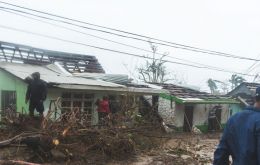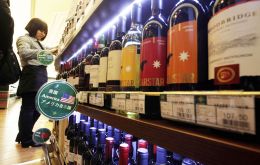MercoPress. South Atlantic News Agency
Economy
-
Sunday, April 1st 2018 - 09:45 UTC
Argentina welcomes 2018 WTTC Global Summit

The World Travel & Tourism Council (WTTC)’s 2018 Global Summit will take place in Buenos Aires, Argentina on 18-19 April.Industry leaders from public and private sector will discuss the theme of ‘Our People, Our World, Our Future’, debating how the sector is placed to create sustainable jobs in a future of transformational technology, increasing environmental pressures, and in a world where security concerns are paramount.
-
Saturday, March 31st 2018 - 21:23 UTC
Retail sales shift in Chile as revenues from articles attractive to Argentines drop

Traditional items keep the retail business going in Santiago's Metropolitan area as sales of articles such as computers, TVs, clothing and sportswear go down as a consequence of a smaller flow of Argentine tourists this past Summer of 2018.
-
Friday, March 30th 2018 - 07:04 UTC
The Economist: Uruguay less dependent on Argentina, Brazil

The British publication The Economist praised Uruguay's progress and underlined its decreasing dependency from giant neighbours Brazil and Argentina.
-
Friday, March 30th 2018 - 03:08 UTC
Odebrecht finds legal loophole to sue Argentine water supplier AySA

The Brazilian firm Odebrecht, under investigation in 12 countries for bribing government officials, has found a loophole in Argentina's legal system to sue state-owned water supplier AySA.
-
Friday, March 30th 2018 - 02:19 UTC
Venezuela sanctioned by Switzerland for human rights violations

Switzerland Wednesday aligned itself with other European countries by imposing sanctions on Venezuela for “human rights violations and
undermining the rule of law and democratic institutions,” the Federal Council announced. -
Tuesday, March 27th 2018 - 09:42 UTC
The World's Biggest Investors Have Lost $436 Billion In 2018

Wall Street is shocked, but it shouldn't be: Tariffs targeting China should have been a given, and now the market's tanking on trade war fears as if it just crept up on everyone, but Trump's been very clear on this.
-
Friday, March 23rd 2018 - 14:00 UTC
Heatwaves, hurricanes, floods: 2017 costliest year ever for extreme weather and climate events, says UN

Hurricanes, monsoon floods and continuing severe drought made 2017 the costliest year ever for severe weather and climate events, according to a new report by the United Nations weather agency launched on the eve of World Meteorological Day.
-
Friday, March 23rd 2018 - 09:13 UTC
China announces US$ 3bn target for retaliation in trade dispute with Washington

China announced a US$ 3 billion list of U.S. goods including pork, apples and steel pipe on Friday that it said may be hit with higher tariffs in a spiraling trade dispute with President Donald Trump that companies and investors worry could depress global commerce. The Commerce Ministry urged Washington to negotiate a prompt settlement to the conflict over Trump's tariff hike on steel and aluminum but set no deadline.
-
Friday, March 23rd 2018 - 09:06 UTC
Argentina expanded 2.9% last year; 2018 challenging given the persistent drought effect on crops

Argentina's economy expanded 2.9% in 2017 from the prior year and 3.9% in the fourth quarter versus the same period in 2016, the Indec statistics agency said this week. The year-over-year figure was slightly above the 2.8% annual growth rate given last month by Argentina's monthly economic activity indicator, seen as a proxy for gross domestic product.
-
Thursday, March 22nd 2018 - 22:22 UTC
Bank of England leaves rates unchanged for now, waiting for more Brexit data

The Bank of England signaled on Thursday that it remains on course to lift interest rates in Britain this year and next, as figures showed a yearlong squeeze on consumers caused by a steep fall in the pound appears to be coming to an end.
